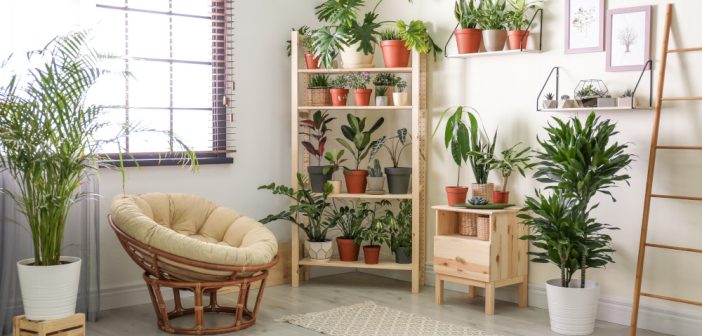Sometimes, it can feel like an impossible task to keep the plants in your home alive. It seems inevitable that the roses in your vase and the pothos on your windowsill will eventually wilt and die. But however difficult it may feel, developing a green thumb will pay dividends toward your future health.
Plants are more than just decorations for your home and offer numerous benefits to both your physical and mental health. Whether you currently have a green thumb or not, keeping plants in your home is a great way to enhance your living space and improve your well-being. Here are just five benefits of keeping plants in your home.
Air Purification
Everybody knows about the vital role that plants play in producing oxygen that the overwhelming majority of Earth’s organisms need to survive. Similarly—but less often acknowledged—plants purify the air around them. Plants absorb carbon dioxide and release oxygen, which can make the air in your home fresher and cleaner.
A study conducted by NASA found that certain indoor plants can remove up to 87 percent of air toxins within 24 hours when paired with an activated carbon filter. This makes plants a great natural way to reduce indoor air pollution and improve air quality. Instead of investing in expensive and cumbersome air filters, protect your lungs by investing in some indoor plants.
Better Sleep
Many people swear by the sleep-enhancing benefits that specific plant compounds, supplements, and essential oils can offer. These sleep aids are often ingested via pills and capsules or are applied on or near a person’s pillow.
Amazingly, plants can benefit your sleep simply by being placed in your home. Certain plants, such as lavender and jasmine, may have a calming effect and help improve sleep quality. Placing these plants in your bedroom can create a relaxing environment that promotes restful sleep. A study by the National Sleep Foundation corroborates these claims, finding that people who had plants in their bedrooms reported sleeping better and feeling more refreshed in the morning. For optimal Zs, make watering your bedside plants a part of your nightly routine.
Productivity Boost
Plants can also help boost productivity in your home. One review article on the psychological effects of plants found that people are significantly more productive when they have more plants in view in the workplace. The same principles apply to home environments, where plants can create a sense of calm and focus, making it easier to get work done.
However, this productivity boost may be a secondhand effect of increased air quality, as research has demonstrated that better air quality improves cognitive performance. Regardless of the precise reasons, adding some green foliage to your home’s decor may help you to get more done.
Mental Health Benefits
In addition to improving physical health, plants can also benefit a person’s mental health. Numerous studies have shown that being around plants can have a positive effect on mental health, primarily through their ability to reduce stress. One study demonstrated that plants can reduce stress even in high-stress environments, such as hospitals.
Urban designers and architects have been taking study findings like these and applying them on a broad scale by designing cities with more green spaces and easier access to natural environments. These changes have broad significance, as increased access to green spaces has been found to reduce overall psychological distress, depressive symptoms, anxiety, and mood disorders. Make sure to fill your home with plants and spend time in nature to reap the psychological benefits of plants and give your mental health a boost.
Creative Inspiration
Plants can also be a great source of inspiration for creative individuals. Claude Monet is said to have esteemed the creative beauty of his garden over all else, saying, “My garden is my most beautiful masterpiece.”
The natural beauty and diversity of plants can help spark creativity and provide new perspectives. A study conducted in Taiwan found that natural environments restore attention and improve creativity. The authors identified several possible reasons that natural environments may stimulate creativity, like inspiring curiosity, distracting our minds from mundane aspects of life, and increasing attentiveness.
Supporting this argument, another study found that having plants in the workplace can enhance creativity. Placing plants indoors, then, may have the ability to inspire creativity in a number of different ways.
In conclusion, keeping plants in your home can have numerous benefits for your physical and mental health. From air purification to enhanced creativity, there are many reasons to bring a little bit of nature indoors. So, whether you choose a small succulent or a large indoor tree, adding some greenery to your living space can help improve your overall well-being.
A version of this article was published by The Daily Herald. It has been republished here with permission.




